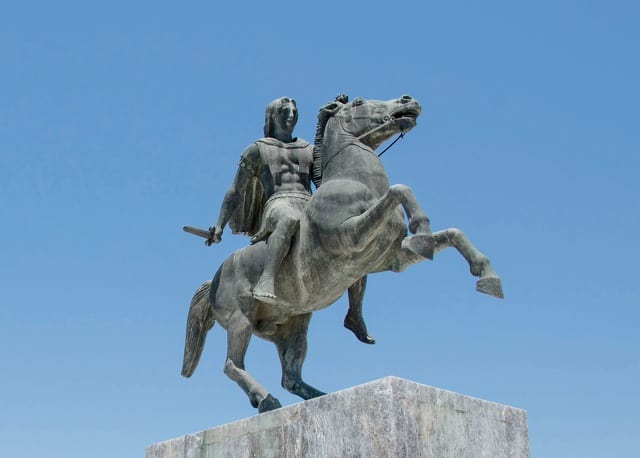Oliver Stone crashed my computer.
I’m sure it was him. We had spent the day in Vergina, a northern Greek village that gained international prominence in 1977 when archeologists found the tomb of Philip II, a significant figure in his own right, but best known as the father of Alexander the Great.
Alexander is so famous that even his horse, Bucephalus, is more renowned than any of his master’s foot soldiers. A monumental statue of man and mount looms over the waterfront here in Thessaloniki. The noisy avenue that separates my apartment from the seafront bears Big Al’s name.
Vergina’s a quiet place in November. Dogs doze on the street leading from the parking lot to the tombs. A drowsy fruit seller stirs at our passing, deftly cuts pear slices into our palms and calls me “maestro.” We buy his pears, pomegranates and persimmons, and he slips a few bruised fruits into the sack, probably because he plans to toss them anyway.
Philip’s tomb is an archeological jackpot. Here, in addition to the bones of the king, buried since the 4th century B.C., are a gold crown of oak leaves and acorns, weapons you wouldn’t want to meet in a dark alley, frescoes of hunting scenes and chariot races, and tiny, exquisitely carved ivory likenesses of Philip, Alexander, Dionysus and Aphrodite and other luminaries of the ancient world.
I am most dazzled by a mural that depicts Hades’ abduction of Persephone. The original art remains entombed, inaccessible to visitors. The photographic copy shows Hades driving his chariot back to the Underworld with one hand while keeping a struggling Persephone from jumping ship with the other.
Arms and fingers outstretched, Persephone desperately reaches back toward her mother, Demeter. The look on her face is pitiable, on his, implacable.
On closer inspection, though, I see that Hades’ eyes aren’t on the road. He’s looking back at his captive in a way that suggests second thoughts about separating his unwilling bride from her grieving mother.
From the tombs we climb to Philip’s palace, a restoration-in-progress with a commanding view of the Macedonian plain. Then we stop in nearby Veria for a meal and a look at the town’s partially but gorgeously restored Jewish quarter and synagogue before driving back to Thessaloniki.
At home we decide to extend our day with Phil and Al by watching Oliver Stone’s film, “Alexander,” with Colin Farrell in the title role, Val Kilmer as his one-eyed pop and Angelina Jolie as his scheming and snake-charming mom.
The movie is relentlessly terrible, from Farrell’s silly blond locks, to his win-one-for-the-Gipper pep talk to his troops on the eve of dismembering a battalion of Persians, to the interminable haven’t-we-seen-this-before battle scene itself, to Angelina’s Macedonia-on-Moskva accent. (Alexander’s soldiers, meanwhile, sound like they’ve strolled over from the set of “Braveheart.”)
One could chalk up my no-stars review to watching an epic on a laptop, but Rotten Tomatoes backs me up. The film’s score with critics is a woeful 16 percent. One of them called it, inelegantly, a “buttnumbathon.” Another described it as “a lunk-headed train wreck.” A third, fittingly for this holiday week, declared it “a garbled, over-stuffed turkey.”)
When we get to the intermission – 100 minutes down, another 100 to go – I snap my computer shut and put it on the floor next to my bed, eager to escape into my dreams, which are bound to be more entertaining than this stinker, even if they’re reruns of yours truly wandering the halls of academia naked and unprepared, trying to find my first class of the semester.
After sleeping it off I take up my computer again and find that it was so disgusted with Stone’s film that it has shut itself off, like a horse bucking an unwanted rider off its back. And when I try to restart it, it clearly holds me responsible for the decision to make it transmit such drivel, for it disavows all knowledge of me, rejecting all my passwords as if I am no longer worthy of accessing its apps or its files.
Desperate, I write to my friends in IT at Penn State, one of whom replies, after much back-and-forth about the problem:
“I’ve never seen a situation where so many passwords and/or the recovery key would fail…this makes me think something may not be right with the keyboard.”
The IT guys’ theory, apparently, is that my computer has gone native and begun typing in Greek. I have, in fact, switched back and forth from US to Greek keyboards while doing an online Greek lesson or translating a word or a phrase from one language to the other (Angelina Jolie is Αντζελίνα Τζολί in Greek, in case you’re wondering).
But I have verified that the machine was back to typing in its user’s native tongue. Absent any new theory from the IT guys, I’m sticking with mine: It’s all Stone’s fault – and mine. I should have left this Stone unturned.
Russell Frank teaches journalism in Penn State’s Bellisario College of Communications. He is spending the 2019-2020 academic year as a Fulbright scholar in Thessaloniki, Greece.



